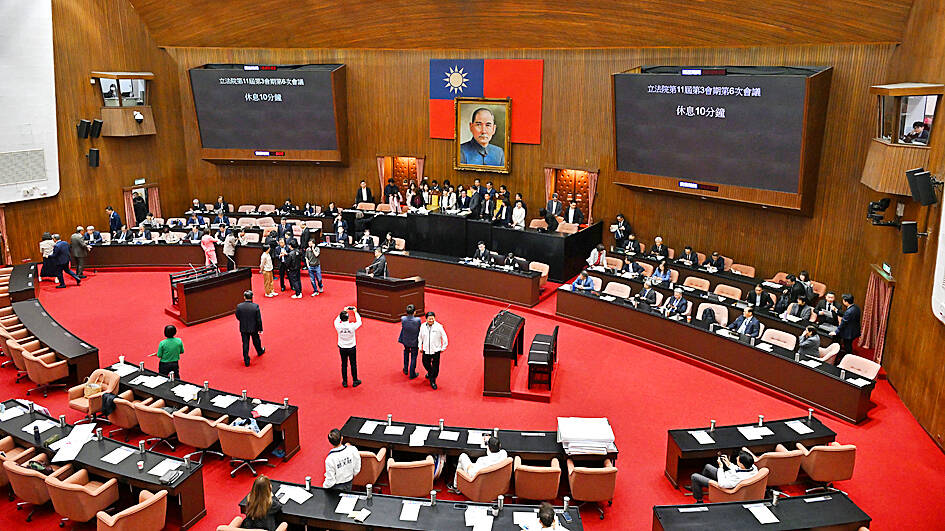Two Chinese Nationalist Party (KMT) referendum proposals on “opposing the abolition of the death penalty” and “opposing martial law” have been placed on the agenda of the legislative plenary session scheduled for tomorrow for discussion before being put to a vote.
The agenda-setting motion was passed on Tuesday in a vote during a meeting of the Legislative Yuan’s Procedure Committee, in which the KMT and the Taiwan People’s Party (TPP) hold a majority.
The Democratic Progressive Party’s (DPP) lawmakers on the committee all voted against the motion.

Photo: Chen Yi-kuan, Taipei Times
The proposed referendum on “opposing martial law” comes after President William Lai (賴清德) in March proposed reinstating military trials.
Martial law was imposed from 1949 to 1987 during a period of KMT authoritarian rule prior to Taiwan’s democratization.
The opposition’s push for the two proposals came after the expiration of the one-month negotiation period required for bills involving interparty disputes before a second reading.
On March 25, the KMT and the TPP jointly moved the proposals directly to a second reading without committee review, following an unsuccessful attempt by the DPP to block their inclusion on the legislative agenda.
The DPP proposed a motion during the Procedural Committee meeting asserting that the March 25 legislative session was illegal and asking that the 62 lawmakers from the KMT, the TPP and independents be sent to the Discipline Committee for contravening statutory meeting procedures and disrupting order at the legislature.
The DPP’s proposal was voted down.

A preclearance service to facilitate entry for people traveling to select airports in Japan would be available from Thursday next week to Feb. 25 at Taiwan Taoyuan International Airport, Taoyuan International Airport Corp (TIAC) said on Tuesday. The service was first made available to Taiwanese travelers throughout the winter vacation of 2024 and during the Lunar New Year holiday. In addition to flights to the Japanese cities of Hakodate, Asahikawa, Akita, Sendai, Niigata, Okayama, Takamatsu, Kumamoto and Kagoshima, the service would be available to travelers to Kobe and Oita. The service can be accessed by passengers of 15 flight routes operated by

Alain Robert, known as the "French Spider-Man," praised Alex Honnold as exceptionally well-prepared after the US climber completed a free solo ascent of Taipei 101 yesterday. Robert said Honnold's ascent of the 508m-tall skyscraper in just more than one-and-a-half hours without using safety ropes or equipment was a remarkable achievement. "This is my life," he said in an interview conducted in French, adding that he liked the feeling of being "on the edge of danger." The 63-year-old Frenchman climbed Taipei 101 using ropes in December 2004, taking about four hours to reach the top. On a one-to-10 scale of difficulty, Robert said Taipei 101

Taiwanese and US defense groups are collaborating to introduce deployable, semi-autonomous manufacturing systems for drones and components in a boost to the nation’s supply chain resilience. Taiwan’s G-Tech Optroelectronics Corp subsidiary GTOC and the US’ Aerkomm Inc on Friday announced an agreement with fellow US-based Firestorm Lab to adopt the latter’s xCell, a technology featuring 3D printers fitted in 6.1m container units. The systems enable aerial platforms and parts to be produced in high volumes from dispersed nodes capable of rapid redeployment, to minimize the risk of enemy strikes and to meet field requirements, they said. Firestorm chief technology officer Ian Muceus said

MORE FALL: An investigation into one of Xi’s key cronies, part of a broader ‘anti-corruption’ drive, indicates that he might have a deep distrust in the military, an expert said China’s latest military purge underscores systemic risks in its shift from collective leadership to sole rule under Chinese President Xi Jinping (習近平), and could disrupt its chain of command and military capabilities, a national security official said yesterday. If decisionmaking within the Chinese Communist Party has become “irrational” under one-man rule, the Taiwan Strait and the regional situation must be approached with extreme caution, given unforeseen risks, they added. The anonymous official made the remarks as China’s Central Military Commission Vice Chairman Zhang Youxia (張又俠) and Joint Staff Department Chief of Staff Liu Zhenli (劉振立) were reportedly being investigated for suspected “serious